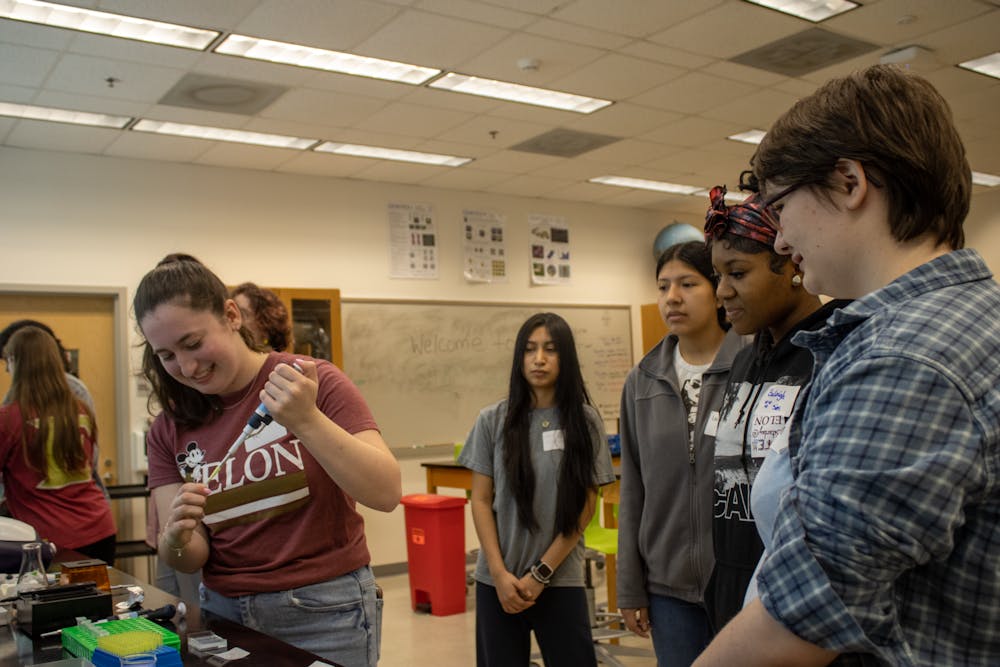Catherine Oliver, a biochemistry and public health major, volunteered for an outreach program with the Alamance-Burlington School System, and said interacting with high school students is a rare opportunity in college.
“It’s awesome to have all this engagement from getting to interact with high school students because we don't really get to do that much more any college now,” Oliver said. “My favorite part has been showing students how to use lab materials and how to pipette. It's been awesome to teach someone else that skill that I, coming into college, didn't know how to, so it's nice to give high school students this opportunity.”
Seniors Samuel Ramirez, president of the Biology club, and Chris D'Inzeo, president of the American Chemical Society Club, led an outreach program aimed at inspiring local Alamance-Burlington School System high school students.
The initiative was funded by Elon’s Student Government Association and Elon Innovation Fund. It was a collaboration among multiple student organizations, including the American Chemical Society, Biology Club, Pre-Health Society, Women in Computer Science, TEATAPs and Formula SAE. This resulted in 41 undergraduate volunteers and faculty.
“We've been interested in outreach for a while because we've benefited from similar programs when we were high schoolers and it made an impact on us,” Ramirez said. “It's sort of us trying to give back in a way, and try to have that impact on other students.”
The program exposes ABSS high schoolers to STEM fields to spark interest and potential career paths. Offered on Saturday, April 20, the free event included transportation and meals to ensure accessibility for all participants. They’re hoping it becomes a once-a-semester event called “Stem Saturday.”
“We kind of took this on out of passion and not thinking about all the nitty gritty little details of things that need to go into planning this event. So there was a lot of, ‘oh by the way, you need to do this,” D'Inzeo said. “It's been a lot of learning but we've had a lot of help from different faculty members, even though it is pretty much entirely student-led.”
The program featured a one-day event comprising demonstrations, interactive activities and hands-on demos. For example, the Biology club conducted a DNA-based crime scene investigation, as well as a bacterial viewing under microscopes.
“I think the overarching goal is to have it be as hands-on as possible and also just generally get them interested, and getting them excited about the underlying science of whatever they’re doing,” D'Inzeo said.
Many professors, staff members across campus, and ABSS Academic Coordinator Erica Bauer played key roles in orchestrating this event. They received guidance and support from various advisers, biology professors who aided with the Institutional Review Board process, and lab managers who ensured safety and logistics. Additionally, university departments facilitated event approvals.
“We want this to happen over and over again, and we want it to be better each time and a lot more with more representation from different groups,” Ramirez said.“I just think it'd be really nice if this became a thing that everybody knew about.”
Baleigh Sims is a sophomore at Hugh M. Cummings High School, she aspires to be a surgeon and is planning on majoring in Biology. She said her favorite part was the "Hot Ice" experiment led by Elon's American Chemical Society student chapter volunteers. They created a highly saturated solution of sodium acetate, heated it, and then cooled it to form a tower-like structure when poured over a speck of sodium acetate. Despite looking like ice, the tower felt hot due to the exothermic reaction.
“I came to this event for the experience,” Sims said. “I wanted to learn new things.”
To measure success, they planned to distribute pre and post-event surveys with specific questions. These surveys will gauge attendees' perceptions of STEM and their confidence levels before and after the event. The surveys will also collect feedback on event aspects liked or disliked by participants. Feedback from volunteers, who played a crucial role in the event's success, will also be gathered to improve future initiatives and to encourage students to enjoy the program.
“We want high schoolers to be stoked about STEM,” Ramirez said.


